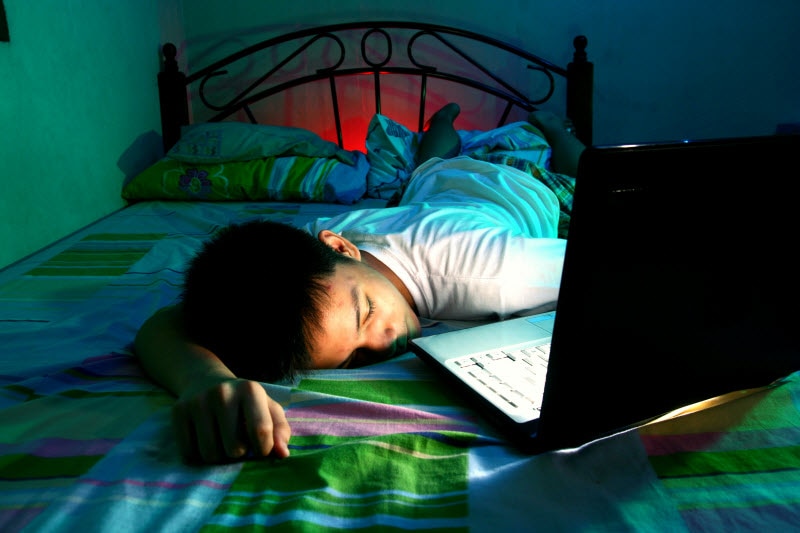While teenagers think burning a candle at both ends is hip, in fact, the habit of staying up late is literally too cool for school. Schoolwork suffers terribly when your teen is sleep-deprived, which at least a third of them are, according to one landmark 2019 study. Just why is sleep so indispensable for your teen?
Why do teenagers need more sleep?
For starters, teenagers are in the midst of a formative period. As they transition to adulthood, their brains are going through a second developmental stage of cognitive maturation and their bodies undergo multiple growth spurts. Adequate sleep supports this rapid development, as well as helps protect teenagers from depression, mood swings, irritability and drug use.
And sleep might be the best unacknowledged study aid: Sleep promotes attention, memory, and analytical thought, helping students think sharper, more expansively and with more discernment. All this is useful whether it’s studying for a test, learning an instrument or acquiring job skills.
Basically, sleep supports every system of the body to function better. It empowers the immune system, regulates hormones, enables muscle and tissue recovery. It helps teenagers control impulsive behavior like drunk driving, texting while driving, riding a bicycle without a helmet, and failing to use a seatbelt. Finally, sufficient sleep wards off the risks that stem from drowsy driving, which when combined with lack of experience behind the wheel can often be fatal.
All in all, sleep is every bit a basic requirement, in importance on par with the need to stay well hydrated and nourished.
How much sleep do teenagers need?
Most experts cite the sweet spot for teen sleep as between 8—10 hours per night. Some pediatricians err towards the upper range, saying that ideally, teens need 9 to 9½ hours of sleep per night, roughly an hour or so more sleep than they needed at age 10. Apparently, all that maturing requires rest to keep up with the pace and demands of extreme growth.
Why are teenagers sleep deprived?
Teens are naturally on a somewhat delayed sleep schedule, due to a natural shift in circadian rhythm. It’s truly hard for them to fall asleep before 11 p.m. When combined with early start times at school, increased homework, extracurricular activities and part-time jobs, it’s surprisingly common to find that teens are sleep deprived. Plus, there is general adolescent proclivities such as a fondness for a very active social media presence that continues into the wee hours, coupled with a penchant for intensely caffeinated drinks. Neither do their sleep hygiene any favors. When late nights pair with early school start times, it’s a set up for teen stress—and lack of sleep.
Is melatonin safe for teenagers?
In general, melatonin seems to be fairly harmless for teenagers, although there are no large-scale multicenter clinical trials to confirm this. A few experts have ongoing concerns on teenagers taking melatonin because of animal-based studies that show melatonin can affect puberty-related hormones. The impact of melatonin on children have been monitored more closely. As the second most used natural product for children, melatonin has relatively few side effects in children, most of them minor, such as morning grogginess, which disappear with discontinuation. Recent studies do show that for children and teens with autism spectrum disorder (ASD), who tend to have lower levels of melatonin, found melatonin supplements helped them fall asleep faster and stay asleep longer.
If you want to help your teen cultivate more intentional sleep habits, here are a few suggestions.
Tips for better teen sleep hygiene
Start the day outside. Having breakfast outside or by a sunny window helps regulate the body’s biological clock. Abundant bright natural light makes it easier for teens to wake up in the morning and drift off at night.
Slot eight hours of sleep into your daily schedule and keep that same schedule on both weekdays and weekends—the consistency is key.
Create an effective bedtime routine to help you relax and unwind.
Avoid overindulging in caffeine and energy drinks. Curtail drinking them in the late afternoon and evening.
Put away electronic devices for at least a half-hour before bed. Try putting them outside the bedroom at night, or in the very least keep them on silent mode to avoid checking them during the night.
Set up your bed with a comfortable mattress and supportive pillow. Declutter your room so it feels calm and restful.
Keep your bedroom cool, dark, and quiet. Cooler temperatures help you sleep better.
Encourage your local school to move toward later start times. Many middle and high schools are exploring the idea of starting school around 8:30 a.m.—the start time recommended by the American Academy of Pediatrics. Talk with your local school board or principal about this issue.


